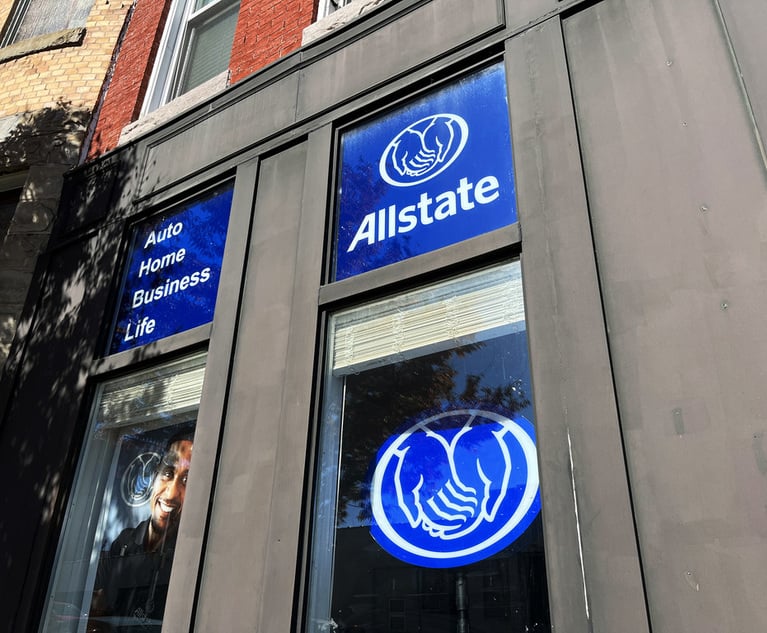Lawyers Can't Be Sued By Nonclients Over Court Statements, Texas Supreme Court Rules
The Texas Supreme Court has reaffirmed one of the strongest immunity protections that civil litigators have by ruling that lawyers cannot be sued by third parties over statements they make in open court on behalf of clients.
April 30, 2018 at 04:15 PM
5 minute read

The Texas Supreme Court has reaffirmed one of the strongest immunity protections that civil litigators have by ruling that lawyers cannot be sued by third parties over statements they make in open court on behalf of clients.
The case, Youngkin v. Hines, stems from a property dispute over a 285-acre tract of land in Brazos County. In that case, Buetta and Rajen Scott hired attorney Bill Youngkin to file an action seeking a declaration that they were the rightful owners of that property. At the same time, another family heir to the land, Billy G. Hines, opposed them in the litigation.
According to the decision, during trial, Youngkin negotiated a settlement with Hines' attorney and then recited the terms of the agreement into the record pursuant to Texas Rules of Civil Procedure 11. Youngkin announced that Hines would convey his undivided surface interest in the 285 acres but would retain his mineral interests in the property. In return, Youngkin stated his clients would convey one-half interest in a 45-acre subsection of the property so the family heirs would have 100 percent ownership of that property. Lawyers for both parties formalized that agreement.
But Hines later alleged that the Scotts, with Youngkin's assistance, deeded their interest in the 45-acre subsection to Curtis Capps, another client of Youngkin's, as trustee. Hines claimed Capps, while represented by Youngkin, sought a declaratory judgment that Capps personally owned a portion of the 45-acre subsection.
Hines then sued the Scotts and Capps for fraud, alleging that they had conspired to deprive him of real property by using the settlement agreement to obtain interest in contested property with no intention of complying with the agreement. Hines later added Youngkin as a defendant, alleging that the attorney knowingly participated in a fraudulent scheme to deprive Hines of the disputed property.
Youngkin moved to dismiss the Hines suit under the Texas Citizens Participation Act (TCPA), which allows trial courts to quickly throw out cases that are based on a person's right to speak, petition or associate. He also raised the affirmative defense of attorney immunity, arguing it shielded him from liability to a nonclient for actions taken in open court while representing a client.
The trial court denied Youngkin's motion to dismiss, which he appealed to Waco's 10th Court of Appeals. And while the 10th Court held that the TCPA applied to the claims against Youngkin, it ultimately concluded that Youngkin had failed to prove his attorney-immunity defense. Youngkin appealed the immunity aspect of the ruling to the Texas Supreme Court.
In its decision, the high court affirmed the appellate court in finding that the TCPA protections applied to Hines's claims against Youngkin because the text of the act “is intended to safeguard the constitutional rights of speech, petition, and association (without foreclosing on the ability to bring meritorious lawsuits),” wrote Justice Debra Lehrmann.
But Lehrmann went further and reversed the appellate court on the immunity point, concluding that the attorney-immunity doctrine applied “forcefully” to the claims against Youngkin, noting that the rule exists to promote loyal and aggressive representation by attorneys without the fear of personal liability.
“Hines's fraud and conspiracy claims are premised on his understanding of the Rule 11 agreement—that he would receive complete ownership of the 45-acre subsection—being the correct one, but Youngkin and his clients do not concede to that interpretation,” Lehrmann wrote. “And, regardless of the intent underlying the parties' settlement, Youngkin's complained-of actions were part of his responsibility to his clients, even if done improperly.”
“It would strain the very existence of settlement agreements if a party could hold an opposing attorney liable for subsequently taking an action or position at odds with that party's understanding of the agreement,” Lehrmann added. “Even more concerning is that such a practice could impute a guarantee of the client's performance onto the attorney merely because he played a role in negotiating his client's agreement.”
The decision reverses the 10th Court's ruling and remands the case back to the trial court for further consideration.
Ty Clevenger, a New York solo practitioner who represents Youngkin on appeal, is pleased with the decision because it protects litigators from liability for merely doing their jobs.
“It's a critical case because otherwise lawyers could literally be sued for reading a settlement agreement into the record,” Clevenger said.
“He did nothing wrong,” Clevenger said of Youngkin. “He simply read a settlement agreement and the opposing party decided later that his clients did not comply with the settlement agreement. So they assumed that he thought the clients would never comply, so it must have been his fault.''
Angus E. “Andy” McSwain, a lawyer with Waco's Fulbright Winniford who represents Hines, did not respond to a request for comment.
This content has been archived. It is available through our partners, LexisNexis® and Bloomberg Law.
To view this content, please continue to their sites.
Not a Lexis Subscriber?
Subscribe Now
Not a Bloomberg Law Subscriber?
Subscribe Now
NOT FOR REPRINT
© 2025 ALM Global, LLC, All Rights Reserved. Request academic re-use from www.copyright.com. All other uses, submit a request to [email protected]. For more information visit Asset & Logo Licensing.
You Might Like
View All
Supreme Court Appears Sympathetic to Law Requiring Porn Sites to Verify Users' Age

Read the Document: DOJ Releases Ex-Special Counsel's Report Explaining Trump Prosecutions
3 minute read
Houston Trial Lawyer Mary-Olga Lovett Leaves King & Spalding to Open Boutique
3 minute read
Allstate Is Using Cell Phone Data to Raise Prices, Attorney General Claims
5 minute readTrending Stories
- 1Class Action Settlements Totaled $40B+ Three Years in a Row: 'We’re in a New Era'
- 2Automaker Pleads Guilty and Agrees to $1.6 Billion in Payouts
- 3MLB's Texas Rangers Search For a New GC and a Broadcasting Deal
- 4Does the Treasury Hack Underscore a Big Problem for the Private Sector?
- 5Gen AI Legal Tech Startup Eve Raises $47 Million Series A Investment
Who Got The Work
J. Brugh Lower of Gibbons has entered an appearance for industrial equipment supplier Devco Corporation in a pending trademark infringement lawsuit. The suit, accusing the defendant of selling knock-off Graco products, was filed Dec. 18 in New Jersey District Court by Rivkin Radler on behalf of Graco Inc. and Graco Minnesota. The case, assigned to U.S. District Judge Zahid N. Quraishi, is 3:24-cv-11294, Graco Inc. et al v. Devco Corporation.
Who Got The Work
Rebecca Maller-Stein and Kent A. Yalowitz of Arnold & Porter Kaye Scholer have entered their appearances for Hanaco Venture Capital and its executives, Lior Prosor and David Frankel, in a pending securities lawsuit. The action, filed on Dec. 24 in New York Southern District Court by Zell, Aron & Co. on behalf of Goldeneye Advisors, accuses the defendants of negligently and fraudulently managing the plaintiff's $1 million investment. The case, assigned to U.S. District Judge Vernon S. Broderick, is 1:24-cv-09918, Goldeneye Advisors, LLC v. Hanaco Venture Capital, Ltd. et al.
Who Got The Work
Attorneys from A&O Shearman has stepped in as defense counsel for Toronto-Dominion Bank and other defendants in a pending securities class action. The suit, filed Dec. 11 in New York Southern District Court by Bleichmar Fonti & Auld, accuses the defendants of concealing the bank's 'pervasive' deficiencies in regards to its compliance with the Bank Secrecy Act and the quality of its anti-money laundering controls. The case, assigned to U.S. District Judge Arun Subramanian, is 1:24-cv-09445, Gonzalez v. The Toronto-Dominion Bank et al.
Who Got The Work
Crown Castle International, a Pennsylvania company providing shared communications infrastructure, has turned to Luke D. Wolf of Gordon Rees Scully Mansukhani to fend off a pending breach-of-contract lawsuit. The court action, filed Nov. 25 in Michigan Eastern District Court by Hooper Hathaway PC on behalf of The Town Residences LLC, accuses Crown Castle of failing to transfer approximately $30,000 in utility payments from T-Mobile in breach of a roof-top lease and assignment agreement. The case, assigned to U.S. District Judge Susan K. Declercq, is 2:24-cv-13131, The Town Residences LLC v. T-Mobile US, Inc. et al.
Who Got The Work
Wilfred P. Coronato and Daniel M. Schwartz of McCarter & English have stepped in as defense counsel to Electrolux Home Products Inc. in a pending product liability lawsuit. The court action, filed Nov. 26 in New York Eastern District Court by Poulos Lopiccolo PC and Nagel Rice LLP on behalf of David Stern, alleges that the defendant's refrigerators’ drawers and shelving repeatedly break and fall apart within months after purchase. The case, assigned to U.S. District Judge Joan M. Azrack, is 2:24-cv-08204, Stern v. Electrolux Home Products, Inc.
Featured Firms
Law Offices of Gary Martin Hays & Associates, P.C.
(470) 294-1674
Law Offices of Mark E. Salomone
(857) 444-6468
Smith & Hassler
(713) 739-1250






